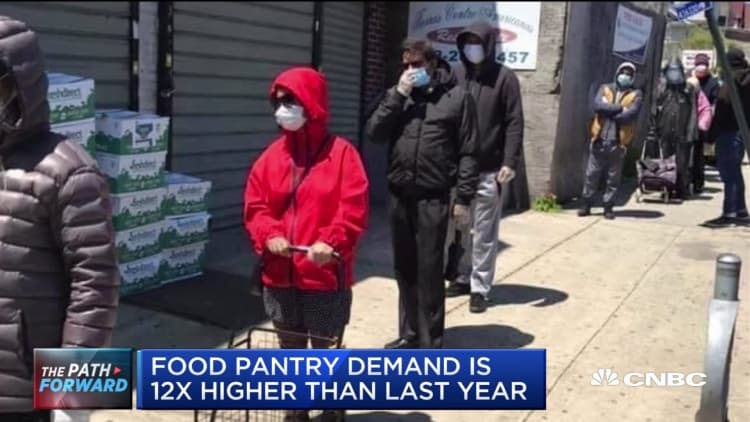As the coronavirus pandemic shut down the economy and put millions out of work this spring, national hunger relief organization Feeding America was squeezed from all sides: demand for food shot up while donations dwindled and delivery channels were choked off virtually overnight.
But its CEO, Claire Babineaux-Fontenot, knew the organization would find a way through.
"In my mind — and though it might sound cliche, it's true — it was a question of, How will we get through this? Not whether we will get through this," she tells CNBC Make It.
"I expect struggles," she says, "but I expect to overcome them."
That mental fortitude and conviction are at least in part a result of how Babineaux-Fontenot grew up, she says.
"Surely DNA might have something to do with it, but I think it is largely my upbringing. My family's story," she says.
That's because Babineaux-Fontenot has 107 siblings.
In the Adoption Hall of Fame
Babineaux-Fontenot, now 56, grew up in the 1960s and '70s in Opelousas in south central Louisiana.
"It's a place where names like Babineaux and Fontenot are certainly very common," she says of the area, which is home to a large number of Cajuns. "They are like Smith and Jones where I grew up."
And in Opelousas, everybody knew about Babineaux-Fontenot's family.
"They knew that I was one of them Babineaux kids," she says. "I am one of 108 children."
Though there weren't more than 16 kids being reared in the home at any one time, over the years, Babineaux-Fontenot's parents, Warren and Mary Alice Babineaux, cared for over 100 children through a combination of birth, adoption and fostering.
According to Chuck Johnson, president and CEO of the National Council for Adoption, hard work and the importance of education "were main lessons" in the Banineaux home. "They sacrificed a lot to care for their family," he says.
Babineaux-Fontenot's parents were even inducted into the National Adoption Hall of Fame in 2008. But Babineaux-Fontenot will never divulge whether she is a biological or adopted child, because "to the family, they are all the same," a Feeding America representative says.
Learning grit from family
Beyond the sheer number of children the Babineauxes raised (according to Johnson, Warren once told him the number was actually closer to 200), many of them had challenges.
"The vast majority of my siblings … came to my family from some combination of neglect and abuse," Babineaux-Fontenot says. "So many of my brothers and sisters have various sundry unique challenges to address around ability, around physical ability, around learning challenges, around deep challenges — emotional, mental health challenges."
But "in spite of all they have been through, they get up in the morning and wash their face and go to work. That is absolutely remarkable considering where so many of us came from," says Babineaux-Fontenot, who is still very close with her father and many of her siblings. Her mother died in 2012.
Her siblings' grit has been an inspiration.
"I've had moments where I have had something tough to do and I have thought about what I have to do is not nearly as tough as what some of my siblings have to do," she says.
Babineaux-Fontenot says she also draws strength from the rest of her family.
"I am the granddaughter of sharecroppers in the deep South on both sides," she says. Her grandparents did not graduate from high school, "but they were brilliant," and they taught her "the dignity in hard work," she says.
"What I have to do is not nearly as tough as what my parents did or what my grandparents did or the generations before those did. And it has been instilled in me — this confidence — that if they can do all of that starting from where they did, then I can do something meaningful standing on their shoulders," Babineaux-Fontenot says.
Finding meaning
That sentiment became especially poignant when Babineaux-Fontenot was diagnosed with cancer in 2015.
Though she has now been cancer free for five years and has a "fabulous" prognosis, at the time, it made her rethink her life and career, and led her to Feeding America, where she became CEO in 2018.
For more than a decade Babineaux-Fontenot had held various executive positions at Walmart, from vice president of audits and tax policy to executive vice president and global treasurer. But when she got sick, she asked herself whether she would be fulfilled if the last thing she ever did professionally was the work she was doing at Walmart.
"My answer was no," she says. "Not knowing all the things I know. Not with my background. Not with my upbringing."
Since Babineaux-Fontenot joined the organization, she has facilitated Feeding America receiving its single largest gift ever — a $100 million donation from Amazon CEO Jeff Bezos in April.
See also:
What it was like to tell my kids I lost my job: 'Aren't you important' Mom?
These are the new hot spots of innovation in the time of coronavirus
Pope Francis: 'This may be the time to consider a universal basic wage'



